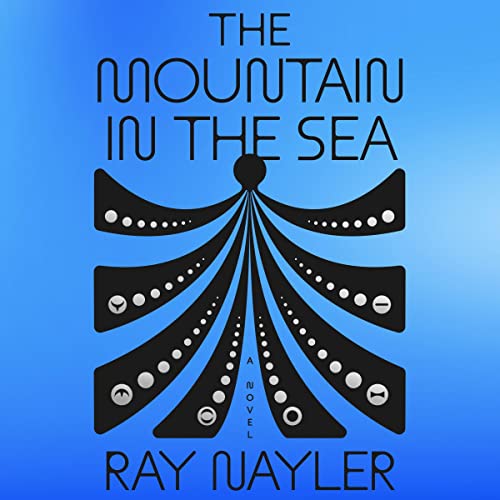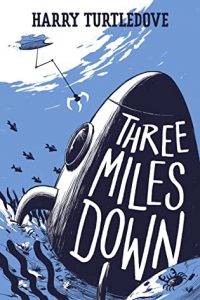 The Mountain in the Sea by Ray Nayler
The Mountain in the Sea by Ray Nayler Narrator: Eunice Wong
Format: audiobook, eARC
Source: supplied by publisher via NetGalley
Formats available: hardcover, ebook, audiobook
Genres: science fiction, climate fiction
Pages: 464
Length: 11 hours and 5 minutes
Published by MCD on October 4, 2022
Purchasing Info: Author's Website, Publisher's Website, Amazon, Barnes & Noble, Kobo, Bookshop.org, Better World Books
Goodreads
Humankind discovers intelligent life in an octopus species with its own language and culture, and sets off a high-stakes global competition to dominate the future.
Rumors begin to spread of a species of hyperintelligent, dangerous octopus that may have developed its own language and culture. Marine biologist Dr. Ha Nguyen, who has spent her life researching cephalopod intelligence, will do anything for the chance to study them.
The transnational tech corporation DIANIMA has sealed the remote Con Dao Archipelago, where the octopuses were discovered, off from the world. Dr. Nguyen joins DIANIMA’s team on the islands: a battle-scarred security agent and the world’s first android.
The octopuses hold the key to unprecedented breakthroughs in extrahuman intelligence. The stakes are high: there are vast fortunes to be made by whoever can take advantage of the octopuses’ advancements, and as Dr. Nguyen struggles to communicate with the newly discovered species, forces larger than DIANIMA close in to seize the octopuses for themselves.
But no one has yet asked the octopuses what they think. And what they might do about it.
A near-future thriller about the nature of consciousness, Ray Nayler’s The Mountain in the Sea is a dazzling literary debut and a mind-blowing dive into the treasure and wreckage of humankind’s legacy.
My Review:
This turned out to be an utterly lovely book. It is very much in the vein of the science fiction of ideas and making them come to life and it just completely sucked me in as though one of the octopuses had just wrapped me in its tentacles and pulled. Hard.
I loved this one a lot more than I expected, which means I’ll probably squee a bit. You have been warned.
It’s clear from the beginning that this takes place on a near-future Earth. The setting isn’t quite dystopian, and it isn’t quite not either. Whether it seems dystopian or not at any given point in the story depends on which of the three point of view characters the story is following at that moment.
Eiko’s perspective is definitely dystopian. He was kidnapped from the streets of Ho Chi Minh City and is a slave on an automated fishing trawler, hunting the world’s depleted oceans for any source of protein that can still be processed into food. His story is tragic and his situation is bleak and getting bleaker by the minute.
Whether Rustem’s situation is dystopian or not depends on whether one thinks that the mostly terrible and generally criminal clients he works with are representative of the way his world works or whether he’s bottom-fishing because he’s an infamous black-hat hacker who conducts assassinations by AI proxy. His current clients do seem to be worse than most, but they’ve given him a more complex and intriguing puzzle than average – and threatened his life if he doesn’t deliver.
If one wonders how those two characters intersect – and this reader certainly did – the glue that holds this story together is the perspective of Marine biologist Dr. Ha Nguyen, who has been whisked away to the remote Con Dao Archipelago by a transnational tech company to fulfill the dream of her life’s work.
 In the waters off Con Dau, DIANIMA Corporation has discovered a pod of octopuses that might, just possibly, have achieved not just a similar level of intelligence to humans, but have also independently developed the skills that vaulted humans to the top of the food chain. DIANIMA has brought Dr. Ha Nguyen to Con Dau because she quite literally wrote the book on the possibility of intelligent, communicating life developing in the world’s oceans.
In the waters off Con Dau, DIANIMA Corporation has discovered a pod of octopuses that might, just possibly, have achieved not just a similar level of intelligence to humans, but have also independently developed the skills that vaulted humans to the top of the food chain. DIANIMA has brought Dr. Ha Nguyen to Con Dau because she quite literally wrote the book on the possibility of intelligent, communicating life developing in the world’s oceans.
If she determines that the pod of octopuses is just a pod of ordinary octopuses – who are plenty intelligent but have no way to pass it on – well, probably not much happens to her and there wouldn’t have been much of a book, either.
But if she finds enough evidence that the octopuses off Con Dau can do what we do, if they have developed language that conveys abstract concepts and have methods of speaking and especially writing that language, then they may hold the key to humans learning to communicate with other species. Or it may be possible to weaponize their abilities through threats, intimidation and superior firepower – assuming that humans actually have superior firepower.
Or they could be a threat. If humans threaten them, they will likely become a threat regardless. So the human sharks and vultures are gathering around Con Dau, whether to protect, to save – or to kill.
Escape Rating A+: If Remarkably Bright Creatures and Three Miles Down had a book baby, it would be The Mountain in the Sea. Which is a fairly strange thought because as much as I loved both those books, they really shouldn’t have any relationship to each other.
But here they do. And it’s surprising and awesome.
As I said at the top, this book is an example, a stellar example in fact, of science fiction of ideas. This is a near-future world, there are no spaceships or extraterrestrials here. It could be said to be a climatological disaster, but if so it’s one that we can see from here.
The heart of that mountain in the sea is the idea of just how damn difficult communication is. It’s an issue that doesn’t get nearly enough play in space opera type SF, and it should. Other species who don’t share our frames of reference probably don’t communicate the way we do – at all.
 So what this story does, and does well, is to convey just the smallest sliver of how difficult it will be to find common ground with a species that doesn’t communicate the way we do, doesn’t have the same species imperatives, doesn’t move through its world the way we do, doesn’t use any body language we recognize. There’s not going to be the equivalent of the Rosetta Stone. It’s Dr. Ha Nguyen’s job to create one from scratch, while never being certain that her interpretation is anywhere near the correct target – let alone hitting a ‘bull’s eye’. If her base assumptions are off base, everything that follows after will be gibberish – with potentially catastrophic consequences.
So what this story does, and does well, is to convey just the smallest sliver of how difficult it will be to find common ground with a species that doesn’t communicate the way we do, doesn’t have the same species imperatives, doesn’t move through its world the way we do, doesn’t use any body language we recognize. There’s not going to be the equivalent of the Rosetta Stone. It’s Dr. Ha Nguyen’s job to create one from scratch, while never being certain that her interpretation is anywhere near the correct target – let alone hitting a ‘bull’s eye’. If her base assumptions are off base, everything that follows after will be gibberish – with potentially catastrophic consequences.
That the author manages to make what could have been a fairly dry story about communication difficulties into a compelling story of relationships between people, octopuses and artificial intelligences turned the whole thing into an utter delight with a surprising ending that mixed more sweet than I expected into a situation that could have turned out so very bitter. That the story managed to bring those three extremely disparate and seemingly disconnected perspectives into a connected whole that brought the whole story full circle made for delicious icing on top of a very yummy story-cake.
I listened to The Mountain in the Sea, and the reader did an excellent job to the point where I found myself hunting for things to occupy my hands so I could listen longer to the story. Much of Dr. Ha Nguyen’s side of the story is a dialog between her written work and that of DIANIMA’s creator, Dr. Arnkatla Mínervudóttir-Chan. The reader did a particularly good job of distinguishing these two strong, intelligent women’s writings from their personal perspectives and their frequently contentious dialog once they finally do meet in person.
In short, a wonderful performance of an excellent book. I’m looking forward to finding more work by this author. Considering that this is his debut novel, I have high hopes for his next book. And if it’s read by the same reader, that will make it even more of a treat!
